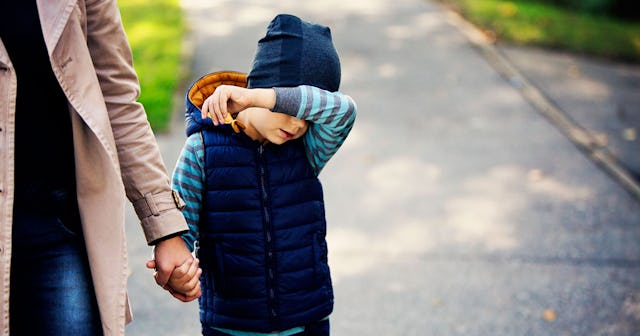7 Parenting Practices That Could Be Damaging Your Kids

Okay, let’s all be really honest: none of us have quite got this parenting thing figured out. And those who say they do might — but they also might have just really honed in on what works for their own littles and what doesn’t. Every parent-kiddo relationship is special and unique. Of course, there are parenting practices we’ve carried on from our upbringing, and plenty we’ve also left behind.
We’ve come a long way when it comes to what defines discipline, as opposed to abuse. With that said, we are constantly growing older and wiser (as my nine-year-old often reminds me).
So for everyone who is figuring it out as they go (including myself), we rounded up seven parenting practices that might be doing more harm than good.
Parenting Practices To Reconsider
Making Discipline a Physical Consequence
Who has told their child if they don’t stop crying, you’ll give them something to cry about? Or how about the classic knock it off, or you’re getting a spanking. When we’re frustrated, it’s easy to default to making discipline a physical consequence. Leading with compassion, empathy, and kindness isn’t always an easy thing to do, but the way you respond will make a difference for your kiddos in the long term. Bottom line? Parenting practices that include abuse is never the answer.
Inhibiting Your Child From Expressing Their Emotions
Toughen up. Rub some dirt on it. Crying is for babies.
No, Karen. Crying is not, in fact, just for babies. When you inhibit and invalidate your littles from feeling all the things, it’s absolutely something they carry into adulthood. I’m not going to say that the adults in my life always telling me to “stop bragging” about accomplishments are solely responsible for the reserved and self-deprecating person I am now. But it certainly didn’t help.
Oversharing Everything About Your Kids’ Experiences
This is a parenting practice that isn’t intentionally trying to cause harm. But parents — some things aren’t meant to be shared. Especially things that your kids assume you aren’t going to go talk about with your sisters-friend’s-2nd grade teacher who you just ran into. By confiding in you, your kids give you the most invaluable gift they can offer: their trust. Don’t break it or lose it. If they can’t trust you now, who can they trust going forward?
Using Negative Language When Talking About Your Kids
It’s one thing to call the little assholes when retelling the tale of their epic meltdown on aisle 6. But it’s a whole other thing to tell them to quit acting like an asshole. The way you talk to your kids and the names you call them are important. Think about it, if a parent calls them derogatory names, it doesn’t set the standards very high for how they expect to be talked to in future friendships or relationships.
Commenting On Your Child’s Body
One of the worst parenting practices that have got to go involves all the unnecessary, sometimes hurtful, comments that come from a well-intentioned place. Whether you tell them they are too skinny or that they’re too chubby, honestly, it will make an impact. Children are constantly growing and changing, and their bodies all look different at any given moment. Do them and yourself a favor by just keeping any judgments or commentary about their appearance to yourself.
Failing To Respect Your Kids Boundaries
We preach about setting boundaries and making sure people in our lives follow them — so why would it be any different for our kids? Believe it or not, our littles having a strong sense of autonomy will help them be more confident and independent. If your child tells you they want to do something on their own (except, you know, like touching a hot stove or something else harmful), let them do it. Failing to respect their boundaries now will only teach them to let everyone else do the same.
Only Acknowledging The Good Things
When the kids do well on a test, of course, we congratulate them. But what about the experiences that aren’t considered “wins”? Sometimes our kiddos go through tough seasons. Maybe cello isn’t their thing, or they thought they would enjoy running track more than they actually do. The point is even though things might not work out, doesn’t mean we don’t say anything. It’s still important to acknowledge them venturing outside their comfort zone and trying something new.
While there are plenty of other questionable parenting practices out there, focusing on handling these seven is a great place to start. Again, no one knows your kiddo and your relationship with them better than you do. So put your own unique spin on each of these practices. At the end of the day, all we’re trying to do as parents is raise empathetic, kind, and well-adjusted humans.
This article was originally published on